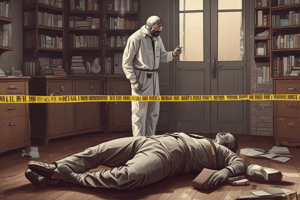Podcast
Questions and Answers
What is one key responsibility of crime scene examiners?
What is one key responsibility of crime scene examiners?
- Conducting interviews with witnesses
- Handling public relations during investigations
- Making arrests on the scene
- Recording, documenting, and examining the scene (correct)
Crime scene investigators should be closely involved with the lead investigator to ensure collaboration.
Crime scene investigators should be closely involved with the lead investigator to ensure collaboration.
False (B)
Name one type of evidence that crime scene investigation often attempts to identify.
Name one type of evidence that crime scene investigation often attempts to identify.
DNA or fingerprints
The failure to collect important evidence can lead to __________ justice being brought into disrepute.
The failure to collect important evidence can lead to __________ justice being brought into disrepute.
Match the following criminal cases with the issues that arose during the investigation:
Match the following criminal cases with the issues that arose during the investigation:
What might evidence collected at a crime scene generate?
What might evidence collected at a crime scene generate?
Forensic identification services are responsible for handling all types of occurrences.
Forensic identification services are responsible for handling all types of occurrences.
What is one potential consequence of missing or misinterpreting evidence at a crime scene?
What is one potential consequence of missing or misinterpreting evidence at a crime scene?
Which of the following positions is NOT traditionally filled by civilian members in Ontario's forensic services?
Which of the following positions is NOT traditionally filled by civilian members in Ontario's forensic services?
Civilian forensic members in Ontario have significantly increased in numbers over the past decade.
Civilian forensic members in Ontario have significantly increased in numbers over the past decade.
Name one police service in Ontario that has civilian forensic roles.
Name one police service in Ontario that has civilian forensic roles.
The primary role of a _____ is to assist in forensic identification efforts.
The primary role of a _____ is to assist in forensic identification efforts.
Match the following forensic roles with their descriptions:
Match the following forensic roles with their descriptions:
What is the salary range for the Forensic Services Assistant position as of January 1, 2022?
What is the salary range for the Forensic Services Assistant position as of January 1, 2022?
All forensic training courses are accessible to civilians without restriction.
All forensic training courses are accessible to civilians without restriction.
Investigative Services Department in Hamilton requires rotating shifts, including 12 hour night shifts from _____ to _____ hours.
Investigative Services Department in Hamilton requires rotating shifts, including 12 hour night shifts from _____ to _____ hours.
What year did the lecturer start policing with the Peel Regional Police?
What year did the lecturer start policing with the Peel Regional Police?
The lectures will be posted on Blackboard after all crime scene photos are included.
The lectures will be posted on Blackboard after all crime scene photos are included.
Who is the Lab Demonstrator mentioned in the lecture?
Who is the Lab Demonstrator mentioned in the lecture?
The course includes areas such as Crime Scene Processing, ____, and Fingerprints and Exhibits.
The course includes areas such as Crime Scene Processing, ____, and Fingerprints and Exhibits.
Match the following roles with their responsibilities:
Match the following roles with their responsibilities:
Which of the following best describes the role of the Crime Scene Investigator?
Which of the following best describes the role of the Crime Scene Investigator?
The lecturer retired from the OPP in 2018 after 18 years of service.
The lecturer retired from the OPP in 2018 after 18 years of service.
What is the first point of contact for lab assistance?
What is the first point of contact for lab assistance?
When did CSI become a TV show?
When did CSI become a TV show?
The Criminal Code of Canada is derived from legislative decisions only.
The Criminal Code of Canada is derived from legislative decisions only.
What does Locard's Exchange Principle state?
What does Locard's Exchange Principle state?
In forensic science, physical items recovered at a crime scene are referred to as _____.
In forensic science, physical items recovered at a crime scene are referred to as _____.
Match the following terms with their definitions:
Match the following terms with their definitions:
What was one of the results of the increased applications in forensic science programs?
What was one of the results of the increased applications in forensic science programs?
DNA was first used to identify a murder suspect in Canada.
DNA was first used to identify a murder suspect in Canada.
What is a crime scene?
What is a crime scene?
What is one potential future role for civilians in forensic science in Ontario?
What is one potential future role for civilians in forensic science in Ontario?
All notes in a lab notebook can be written on loose paper.
All notes in a lab notebook can be written on loose paper.
Who is Christina Pidgeon?
Who is Christina Pidgeon?
Every entry in the lab notebook must include the date, shift time, weather, and __________.
Every entry in the lab notebook must include the date, shift time, weather, and __________.
Match the following forensic roles with their descriptions:
Match the following forensic roles with their descriptions:
Which type of ink is preferred for lab notebook entries?
Which type of ink is preferred for lab notebook entries?
Notebooks must be formatted randomly without any set structure.
Notebooks must be formatted randomly without any set structure.
What should be done if a day off occurs regarding notebook entries?
What should be done if a day off occurs regarding notebook entries?
Flashcards are hidden until you start studying
Study Notes
Introduction
- Instructor has a background in policing, forensic identification, and teaching
- Instructor holds a Bachelor of Arts and a Bachelor of Commerce degree
Syllabus
- The syllabus is available on Blackboard
- Lectures will be posted on Blackboard by Monday morning
- Material covered in lecture but not included in PowerPoint presentations is testable
- There will be breaks during lectures
Course Topics
- Crime Scene Processing
- Photography
- Fingerprints
- Exhibits
- Vehicle Examinations
- Crime Scene Management (MCM)
- Firearms
- Death Investigations
Lab Information
- Labs will take place in the Forensics Crime Scene Facility (FCSF)
- Labs start in week 3 for odd sections, and week 4 for even sections
Email Information
- Use "FRSC 3010" in the subject line
- Be clear and concise in the body of the email
- Only use Trent University email to discuss course matters
History of Crime Scene Investigation (CSI)
- CSI became a popular TV show in 2000
- DNA was first used to identify a murder suspect in England in 1987
- Technology advancements have improved crime scene investigation
- Data banks (like AFIS and CODIS) were developed
- Enrollment in forensic science programs increased significantly after the rise of CSI
- Trent University built a forensic science facility on campus
Legal Framework
- Forensic science is the application of science to legal matters
- Canada uses a common law system
- The Criminal Code of Canada defines criminal acts and procedures
- Locard's Exchange Principle states that "every contact leaves a trace"
Defining Crime Scenes and Evidence
- A crime scene is any location that might provide evidence of a crime
- Crime scene evidence is physical items (exhibits) that are recovered at or in relation to a crime scene
- Evidence can connect people and objects
- Crime scene evidence is important for legal proceedings
The Scientific Method in Crime Scene Investigation
- Crime scene investigation uses the scientific method
- Observations: crime scene and evidence
- Hypothesis: possible explanations for what was observed
- Experimentation: validating or invalidating the hypothesis
Crime Scene Investigation: Importance and Bias
- Crime scene investigation locates, documents, and seizes evidence
- Evidence may provide investigative leads
- Specialized training is required for crime scene investigators
- Crime scene investigators should be independent from lead investigators to avoid bias
- Misinterpreted or missed evidence could result in wrongful convictions or charges
Examples of Crime Scene Investigation: Wrongful Convictions
- Brenda Waudby: wrongfully convicted of her daughter's murder
- Paul Bernardo and Karla Homolka: serial killer investigation
Forensic Identification Services
- Forensic identification services are a support service for police investigations
- Response level varies based on the nature of the incident and police service policy
- Forensic members are responsible for:
- Recording, documenting, and examining the scene
- Collecting and preserving evidence
- Submitting exhibits for further processing
- Testifying in court
- Working independently and without bias
- Supporting front line officers and investigators
Forensic Identification Roles
- Forensic identification officers (FIO) are traditionally police officers trained in forensic investigation
- Civilian members are now more prevalent and perform a variety of roles
- Common forensic roles include:
- Forensic artist
- Document examiner
- AFIS technician
- Photo technician
- DNA coordinator
- Livescan/photo lineup technicians
- Plan drawing
- Forensic identification assistant (FIA)
The Future of Forensic Identification
- The role of civilians is growing
- Civilian members might eventually replace uniform members
- Consider the "positives and negatives" of this potential change
Trent Alumni in Forensic Science
- Trent University graduates are now working in various forensic positions
Lab Notebook Requirements
- Bound notebook is required for each lab
- Notes must be written in ink (black or blue)
- Record date, time, name of instructor, and partners for each lab
- Rough sketches must be recorded in the notebook
- Follow lab directions
Lab Notebooks in the Workplace
- Must be written in an approved format
- Notes should be written using black or blue ink (black preferred)
- Account for every page in the notebook (numbered and none missing)
- Each day of the year must have an entry (including rest days, court appearances, vacation, etc.)
- Start each day with the date, time, weather, and temperature
- The start and end times of the shift should be recorded
- Record all important events and information
- Sign the notebook at the end of each day
- Notes should be started as soon as possible after an assignment or call to a scene
Studying That Suits You
Use AI to generate personalized quizzes and flashcards to suit your learning preferences.




